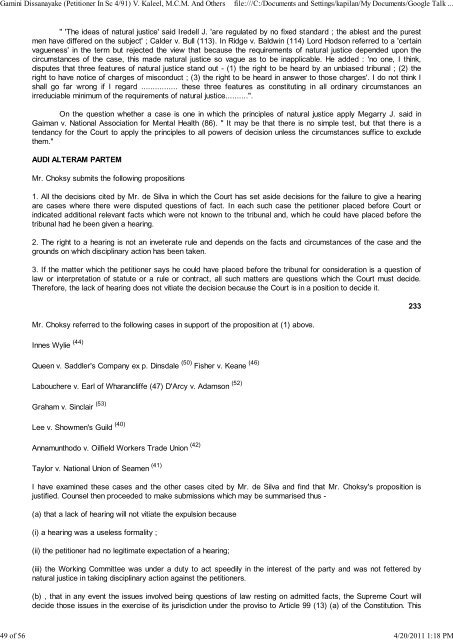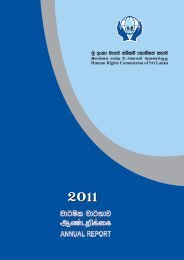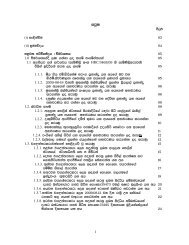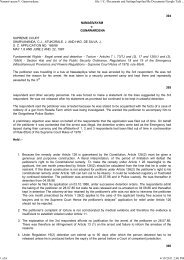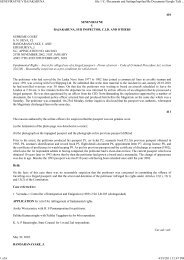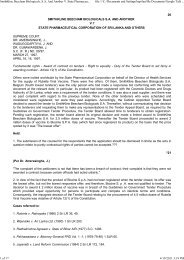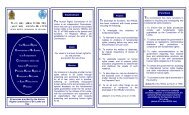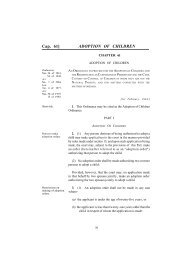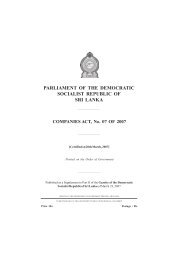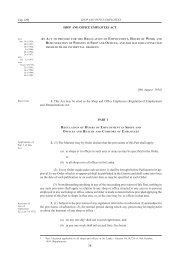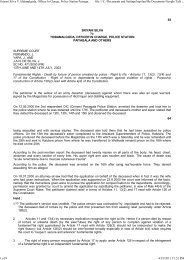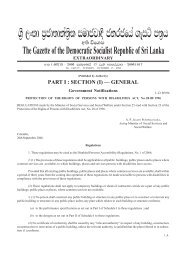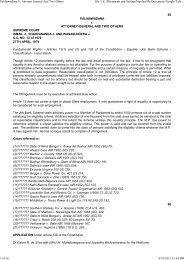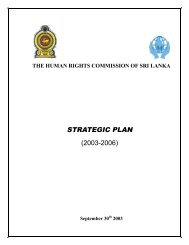Gamini Dissanayake (Petitio... - Human Rights Commission of Sri ...
Gamini Dissanayake (Petitio... - Human Rights Commission of Sri ...
Gamini Dissanayake (Petitio... - Human Rights Commission of Sri ...
Create successful ePaper yourself
Turn your PDF publications into a flip-book with our unique Google optimized e-Paper software.
<strong>Gamini</strong> <strong>Dissanayake</strong> (<strong>Petitio</strong>ner In Sc 4/91) V. Kaleel, M.C.M. And Others file:///C:/Documents and Settings/kapilan/My Documents/Google Talk ...<br />
" 'The ideas <strong>of</strong> natural justice' said Iredell J. 'are regulated by no fixed standard ; the ablest and the purest<br />
men have differed on the subject' ; Calder v. Bull (113). In Ridge v. Baldwin (114) Lord Hodson referred to a 'certain<br />
vagueness' in the term but rejected the view that because the requirements <strong>of</strong> natural justice depended upon the<br />
circumstances <strong>of</strong> the case, this made natural justice so vague as to be inapplicable. He added : 'no one, I think,<br />
disputes that three features <strong>of</strong> natural justice stand out - (1) the right to be heard by an unbiased tribunal ; (2) the<br />
right to have notice <strong>of</strong> charges <strong>of</strong> misconduct ; (3) the right to be heard in answer to those charges'. I do not think I<br />
shall go far wrong if I regard ................ these three features as constituting in all ordinary circumstances an<br />
irreduciable minimum <strong>of</strong> the requirements <strong>of</strong> natural justice..........".<br />
On the question whether a case is one in which the principles <strong>of</strong> natural justice apply Megarry J. said in<br />
Gaiman v. National Association for Mental Health (86). " It may be that there is no simple test, but that there is a<br />
tendancy for the Court to apply the principles to all powers <strong>of</strong> decision unless the circumstances suffice to exclude<br />
them."<br />
AUDI ALTERAM PARTEM<br />
Mr. Choksy submits the following propositions<br />
1. All the decisions cited by Mr. de Silva in which the Court has set aside decisions for the failure to give a hearing<br />
are cases where there were disputed questions <strong>of</strong> fact. In each such case the petitioner placed before Court or<br />
indicated additional relevant facts which were not known to the tribunal and, which he could have placed before the<br />
tribunal had he been given a hearing.<br />
2. The right to a hearing is not an inveterate rule and depends on the facts and circumstances <strong>of</strong> the case and the<br />
grounds on which disciplinary action has been taken.<br />
3. If the matter which the petitioner says he could have placed before the tribunal for consideration is a question <strong>of</strong><br />
law or interpretation <strong>of</strong> statute or a rule or contract, all such matters are questions which the Court must decide.<br />
Therefore, the lack <strong>of</strong> hearing does not vitiate the decision because the Court is in a position to decide it.<br />
Mr. Choksy referred to the following cases in support <strong>of</strong> the proposition at (1) above.<br />
Innes Wylie (44)<br />
Queen v. Saddler's Company ex p. Dinsdale (50) Fisher v. Keane (46)<br />
Labouchere v. Earl <strong>of</strong> Wharancliffe (47) D'Arcy v. Adamson (52)<br />
Graham v. Sinclair (53)<br />
Lee v. Showmen's Guild (40)<br />
Annamunthodo v. Oilfield Workers Trade Union (42)<br />
Taylor v. National Union <strong>of</strong> Seamen (41)<br />
I have examined these cases and the other cases cited by Mr. de Silva and find that Mr. Choksy's proposition is<br />
justified. Counsel then proceeded to make submissions which may be summarised thus -<br />
(a) that a lack <strong>of</strong> hearing will not vitiate the expulsion because<br />
(i) a hearing was a useless formality ;<br />
(ii) the petitioner had no legitimate expectation <strong>of</strong> a hearing;<br />
(iii) the Working Committee was under a duty to act speedily in the interest <strong>of</strong> the party and was not fettered by<br />
natural justice in taking disciplinary action against the petitioners.<br />
(b) , that in any event the issues involved being questions <strong>of</strong> law resting on admitted facts, the Supreme Court will<br />
decide those issues in the exercise <strong>of</strong> its jurisdiction under the proviso to Article 99 (13) (a) <strong>of</strong> the Constitution. This<br />
49 <strong>of</strong> 56 4/20/2011 1:18 PM<br />
233


